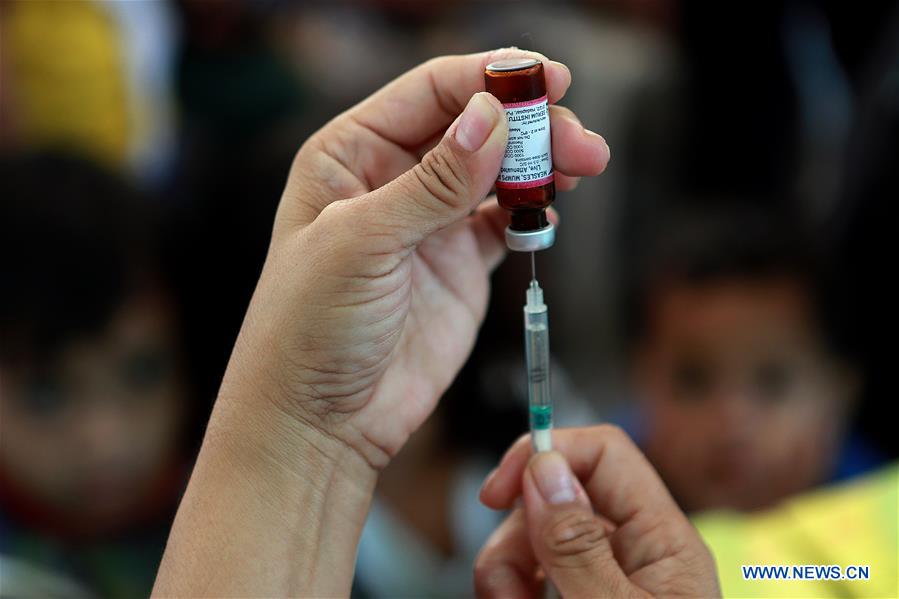
A medical worker prepares a free measles vaccine during the Philippine Red Cross Measles Outbreak Vaccination Response at a slum area in Manila, the Philippines, Feb. 16, 2019. The Philippine Department of Health (DOH) reported this week that over 4,300 measles cases were confirmed from Jan. 1 to Feb. 13, 2019, with the number expected to increase in the coming days. (Xinhua/Rouelle Umali)
MANILA, Feb. 15 (Xinhua) -- Philippine President Rodrigo Duterte urged parents on Friday to get the measles vaccine for their children, saying vaccination is the only way to prevent infection from the highly contagious viral disease.
In a short message aired on state-run television, Duterte voiced alarm over the rising measles cases in the Philippines.
"Countrymen, measles cases are rising, and its complications are fatal. Vaccination is the only way we can prevent our children from getting the disease," Duterte said.
Duterte's appeal came amidst rising measles cases and deaths in the Philippines in seven regions, including in Metro Manila.
The Department of Health (DOH) reported this week that over 4,300 measles cases were confirmed from Jan. 1 to Feb. 13, 2019, with the number expected to increase in the coming days.
Severe complications from measles have also claimed the lives of 87 people as of Monday, one in three of whom were children younger than nine months old.
The DOH on Feb. 6 declared a major measles outbreak in Metro Manila, which has now expanded to other areas of the Philippine main Luzon island and Central and Eastern Visayas in the central Philippines.
Following the declaration of the outbreak, the DOH is ramping up public information and supplemental vaccination activities in Metro Manila, and many parts of the country.
The World Health Organization (WHO) is working closely with the DOH in advancing the call for parents to have their children vaccinated and avoid close contact with those identified as measles patients.
According to the DOH surveillance data, more than 80 percent of 2.6 million unvaccinated children are in the seven regions which have declared outbreaks.
In San Lazaro Hospital in Manila, three wards have been opened to accommodate the influx of patients from Metro Manila and neighbouring regions.
On Thursday, the DOH ordered all of its hospitals to open fast lanes for measles.
The DOH is looking at April or May as the possible period when it can control the spread of measles.
"We don't want to unduly raise expectations, then we cannot deliver, so I think the most prudent estimation would be about April or May -- probably last week of April to about first few weeks of May," Health Secretary Francisco Duque said.
Duque noted that as of now, there is still a "rising trend" of measles so the outbreaks may not be contained earlier than this period.
"We are looking for parameters that it is now under control, but for now, we are still seeing (an) uptrend... We cannot say that the trend is starting to reverse because it hasn't," Duque said.
Measles is a very contagious disease caused by a virus. It spreads through the air when an infected person coughs or sneezes. Measles starts with fever. Soon after, it causes a cough, running nose, and red eyes. Then a rash of tiny, red spots breaks out. It starts at the head and spreads to the rest of the body.
On Feb. 13, the National Disaster Risk Reduction and Management Council (NDRRMC) requested its regional disaster offices to convene their respective response clusters to monitor possible outbreaks in their respective areas.
Government agencies continue to respond by assisting with distributing vaccine, deploying medical personnel to promote awareness and provide immunization.
The Department of Education is gathering data on measles cases and conducting evaluations in schools.
The DOH met with international health partners on Feb. 15 to provide updates on the response to the outbreak.
Already, the DOH activated its Incident Command System to implement the nationwide vaccination campaign which will target 95 percent of the estimated 2.6 million unvaccinated children under five.
Children 0 to 59 months old will also be provided with the polio vaccine as the Philippines is on the watch list for possible disease outbreak.
The DOH reported that it has in-country stockpiles of five million doses of measles vaccines.
With the declaration of an outbreak, the agency was able to use its emergency response funds which allows it to procure, through the United Nations International Children's Emergency Fund (UNICEF), one million vaccines which are expected to arrive in March.
The DOH has further requested UNICEF to facilitate the purchase of another five million vaccines which are expected to be delivered in four to eight weeks.
The WHO and UNICEF are working closely with the DOH to contain the outbreak. Both agencies are providing technical and some funding support to the national programme in the planning, implementation and monitoring of response activities.
UNICEF is responding to a request of the DOH to provide tents which will be used for the vaccination programme and will also mobilize its non-governmental organizations network for support.















